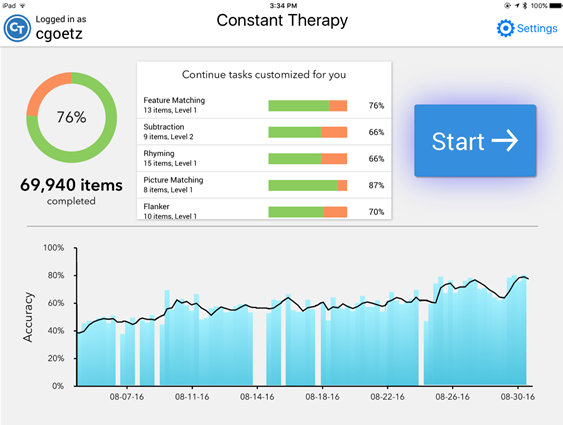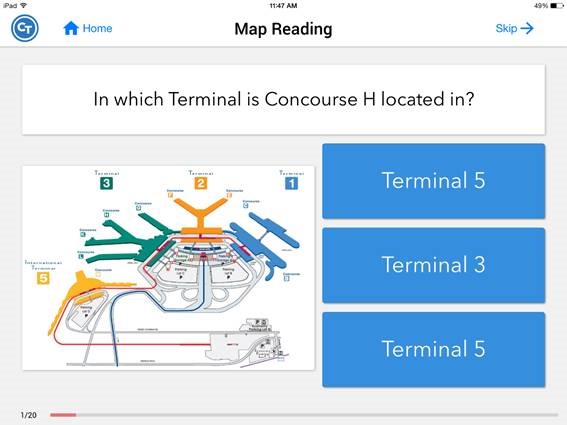When a person has a brain injury due to a stroke or a trauma, they typically start in a hospital emergency room to treat any life threatening injuries. They are then often transferred to an inpatient rehabilitation program at the hospital where they receive intensive physical and cognitive therapy until they are well enough to transition home.
If they have a decent insurance plan, they will then receive outpatient therapy each week for approximately 12 weeks in one hour sessions. That period is where the bulk of the cognitive and speech therapy is delivered.
Historically, that therapy was delivered by a speech and language pathologist (SLP) using workbooks and flash cards that contain content scientifically designed to challenge and stimulate the brain.
Because of brain plasticity, that stimulation with those brain exercises helps the brain recover and rewire so functions like reading, memory and speech can be regained.

Can you please outline the research at Boston University the apps were born out of?
Dr. Swathi Kiran, in the Boston University brain plasticity research labs, felt that there was a better way to deliver and improve upon these therapy tools and methods.
She worked with a team of SLPs and technologists to digitize all of the clinically proven therapy content being used in the therapy and to make it available on mobile devices. The benefits were immediate and soon began to change the way SLPs delivered and patients received brain therapy.
- The digital content is much more engaging and fun...colors, animations, voice prompts, clues, variety, etc.
- The volume of unique content grew quickly as it is much easier to add and update new exercises in digital form.
- The content is always fresh because it is Cloud based and updated regularly for all users at once around the world.
- The therapy can be continued outside of the clinician's office so users can practice and continue to improve at home between visits and after their clinic therapy is used up
- The product collects, measures and analyzes every interaction by each person with the therapy content. That allows for tracking improvements real time and sharing that with patients and clinicians. This is very motivating for the patient and helps clinicians understand precisely where more therapy is needed.
- The data collected from all patients is then stored and analyzed to gain insights into what therapy content works best for which types of disorders and demographics. This is a real breakthrough as that data was too hard to collect before Constant Therapy. So the technology recommends the most effective therapy protocol for each person.
- The technology then monitors each patient's progress and performance and adjusts the therapy exercises and difficulty levels automatically.
- The results are much more therapy which everyone knows is positive as well as improved outcomes from the personalized therapy content delivered.

How do the apps work? Are there different versions for different conditions?
Constant Therapy now has over 65 different categories of cognitive, speech and life skills exercises with over 100,000 variations and growing.
The therapy is optimized today for any type of brain injury and adjusts and personalized treatment for each individual regardless of severity or age.
What stage of development are the apps at?
We are now conducting clinical trials on new applications using the same technology and much of the same content but with new algorithms meant to optimize therapy for these conditions.
One that we are very excited about is a trial at the VA in Boston where people with early stage Alzheimer's Disease are receiving Constant Therapy while a control group receives other brain stimulation like crossword puzzles and sudoku.
The clinical team running the study will determine whether the experimental group maintains cognitive clarity for a longer time which would be a great advance for our aging population.
What feedback have you received so far?
The data we have from over 25 million brain exercises delivered in the past 2 years has shown that even people who had a brain injury a decade ago can regain lost cognitive function, that even severely injured patients can recover very well and that more therapy leads to better outcomes across the board.
How do your apps differ from others on the market?
We have a strategy of being strictly clinically researched and validated. There are many "brain games" companies out there advertising Applications that are not based on research and people need to understand the difference.
We are currently involved in many university-based research programs on other applications for Constant Therapy and will roll them out one at a time as they are clinically proven to be effective.
What’s your vision for Constant Therapy?
Our vision is for Constant Therapy to revolutionize the treatment of multiple types of neurological conditions worldwide and allow people to take more control of their recovery.
I joined Constant Therapy as CEO because I believe we have the opportunity to help millions of people live better lives and grow a successful company at the same time...a nice double bottom line.

Where can readers find more information?
More information is available on our web site www.constanttherapy.com
About Keith Cooper
Keith Cooper is a successful entrepreneur with more than 25 years running VC-backed technology companies.
He is currently CEO of Constant Therapy (CT), a company revolutionizing the treatment of neurological disorders using science-based digital therapy on mobile devices. Keith is also Chairman of SiteSpect, a leading web site multivariate testing company.
Prior to CT, Keith was CEO of Connotate (web Big Data aggregation), President of Carbonite (#9 on the Inc. 500 list, Best Places To Work in Boston, Most Innovative Companies in New England, IPO on NASDAQ 2011), CEO of webHancer (acquired by Microsoft), CEO of FaxNet (acquired by Critical Path) and GM of Trans National Communications (#12 on the Inc. 500 list).
A graduate of Harvard Business School (1988) and Harvard College (1983, President of the Harvard Rugby Club), Keith lives in Wayland, is married and has two young adult sons.